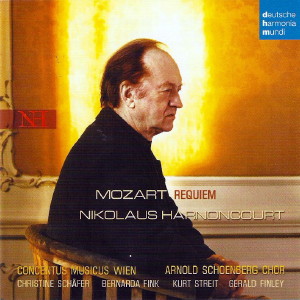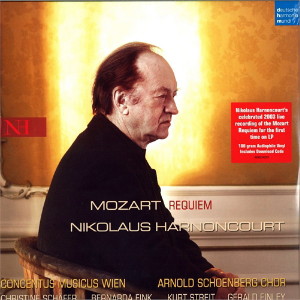 |
1 CD -
82876 58705 2 - (p) 2004
|
 |
| 2 LP -
88985342001 - (c) 2016 |
|
| Wolfgang
Amadeus Mozart (1756-1791) |
|
|
|
|
|
|
|
| Requiem d-moll, KV 626 |
|
|
|
| Completed by Franz Xaver
Süssmayr (1766-1803) - [New, Revised
Edition by Franz Beyer] |
|
|
|
|
|
|
|
| I. Introitus: Requiem (Chor,
Sopran) |
|
4' 57" |
1
|
| II.
Kyrie (Chor) |
|
2' 56" |
2
|
| III. Sequenz: |
|
19' 41" |
|
| - Dies irae (Chor) |
1' 50" |
|
3
|
| - Tuba mirum (Sopran, Alt,
Tenor, Bass) |
3' 52" |
|
4
|
| - Rex tremendae(Chor) |
1' 58" |
|
5
|
- Recordare(Sopran, Alt,
Tenor, Bass)
|
6' 19" |
|
6
|
| - Confutatis (Chor) |
2' 35" |
|
7
|
| - Lacrimosa(Chor) |
3' 07" |
|
8
|
| IV.
Offertoriun: |
|
6' 52" |
|
- Domine Jesu (Chor, Sopran,
Alt, Tenor, Bass)
|
3' 50" |
|
9
|
- Hostias (Chor)
|
3' 02" |
|
10
|
| V. Sanctus (Chor) |
|
1' 19" |
11
|
VI. Benedictus (Chor, Sopran, Alt,
Tenor, Bass)
|
|
5' 20" |
12
|
VII. Agnus Dei (chor)
|
|
3' 25" |
13
|
VIII. Communio: Lux
aeterna (Chor, Sopran)
|
|
5' 45" |
14
|
|
|
|
|
| Christine Schäfer,
Soprano |
|
| Bernarda Fink,
Alto |
|
| Kurt
Streit,
Tenor |
|
| Gerald Finley,
Bass |
|
|
|
| Arnold Schoenberg Chor
/ Erwin Ortner,
Chorus Master |
|
| Concentus
Musicus Wien |
|
|
|
Nikolaus
Harnoncourt
|
|
|
Luogo
e data di registrazione
|
| Großer
Musikvereinssaal, Vienna (Austria) - 27
novembre / 1 dicembre 2003 |
|
Registrazione
live / studio
|
| live |
Producer
/ Engineer
|
Friedemann
Engelbrecht / Michael Brammann / Josef
Schütz (ORF)
|
Prima Edizione CD
|
| Deutsche
Harmonia Mundi - 82876 58705 2 - (1 cd)
- 50' 15" - (p) 2004 - DDD |
|
Prima
Edizione LP
|
| Deutsche
Harmonia Mundi - 88985342001 - (2 lp) -
24' 27" + 25' 48" - (c) 2016 - DIG |
Note
|
| Il
CD contiene una traccia CD-Rom
contenente copia del manoscritto
originale del Requiem. |
|
| Mozart and his
Requiem: A musician's
reflections and Feelings |
It
is undeniably tempting to speculate what
course Mozart’s music would have taken
if he hadn’t died such a tragically
early death. A 70-year-old Mozart would
have been a vigorous contemporary of
Beethoven and Schubert, of\Weber and the
young Mendelssohn. One can well imagine
that these composers might have written
different music if they had had Mozart
looking over their shoulder, as it were.
Not only musical history, but probably
world history, too, would have evolved
differently: Mozart would probably have
been the musical focus ofthe Congress of
Vienna, instead of Beethoven...
The great works that Wolfgang Amadeus
Mozart penned in the last months of his
life point the way - the Clarinet
concerto, Zauberflöte, La
clemenza di Tito and the Requiem:
the tonal language becomes more
succinct, the melodies more ‘catchy’,
the harmonies and the overall sound more
‘Romantic’. A significant contribution
in this respect is made by the
clarinets, whose soft tone, capable as
it is of modulation, blends with the
sounds of the horns and the strings much
better than the customary oboes. In the
19th century, clarinets were actually
used in many symphonies in place of the
oboes called for in the score, in order
to create this 'Romantic' sound. In the
Requiem, Mozart specifies bassett horns
in F - a newly-developed type of
clarinet whose veiled, dark sound is
heard in the opening bars, and which
Mozart returns to time and again as a
source of peace and comfort after the
outbursts of the choir, of the trumpets
and trombones. (These are just my own
impressions I am describing here, I'm
not attempting a musicological
analysis.)
The appearance of the great G minor
Symphony expressed clearly what had
already been hinted at before - in the
chamber music, in the death quartet in Idomeneo:
a glance into the dark recesses of the
soul that was ‘unheard of' in the music
of Mozart's day. This new tonal language
was felt to be so shocking that the
Swiss composer and publisher Hans Georg
Nägeli (1773-1836) wondered whether one
should even expose the public to it!
This Symphony in the ‘death key' of G
minor had a decisive influence on my own
career: time after time in my days as an
orchestral musician, I was forced to
play it in such harmless and sugary
interpretations that in the end I
couldn’t bear this misunderstanding of
Mozart’s music any longer: I had no
choice but to leave the orchestra and
take up the baton myself!
Mozart’s Requiem had an overwvhelming
effect from the outset - on concert
audiences, of course, but also on
generations of composers. Even
Beethoven, who was himself nothing if
not a radical musical spirit, found it
“too wild and terrible”. He was going to
write one himself, but more
“conciliatory” in manner. Today, we are
suprised at such reactions, for we
hardly expect to find such devastation
and terror even in Mozart’s most
shattering works (there is a parallel
here to the reception of the G minor
Symphony). The best part of a century
later, Bruckner still regarded the
Requiem as a model and an unattainable
masterpiece that he quoted time after
time in his symphonies - e.g., the
harmonic sequence of four bars with
which the autograph score of the Lacrimosa
ends on the words "qua resurget ex
favilla judicandus homo reus", or the
opening motif of the Introitus
in the woodwind and in the chorus
“Requiem aeternam”. This unbroken
effect, indeed popularity, over a period
of more than 200 years is something i
can’t explain, and it affects me too on
an entirely personal level.
I had already played the Requiem in the
orchestra when I was but a child, and
was deeply moved. Why? Many listeners
have the same experience; this is
haunting music, a work that literally
‘gets under your skin’, no matter what
objections the musicologists and Mozart
experts may voice about the fragmentary
character of the piece or about
Süßmayr's inadequate completion ofthe
score. Most ofthe additional music
undoubtedly has its roots in Mozart -
Süßmayr must have had sketches or other
information at his disposal, otherwise
real Mozartian thematic and harmonic
crossreferences would not have been
possible, these would have been beyond
Süßmayr's abilities. (To give a couple
of examples of what I mean: the bass in
the Agnus Dei is an enlargement
of the Requiem theme; the interval steps
of the Hosanna correspond to
those of the Recordare; and the
melody of the Sanctus
corresponds to that ofthe Dies Irae.)
Süßmayer's mistakes have been corrected
as far as possible in Franz Beyer’s
edition, but Beyer deliberately
refrained from adding any newly-composed
music. Thus we have to go without the Amen
fugue (at the end of the Lacrimosa)
as the conclusion of the Dies Irae
sequence.
There’s one more thing I’d like to point
out. In nearly all other cases, Mozart’s
music is conspicuously independent of
his biography. The great composer wrote
sad or light-hearted works irrespective
of his own state of mind; this much is
convincingly conveyed in Hildesheimer’s
book on Mozart. But the Requiem seems to
be the exception that proves the rule:
in the truly terrifying Dies Irae
sequence, for example, the composer’s
fortunes are reflected so movingly in
the music that the personal relevance
cannot be missed (e.g. Recordare:
"statuens in parte dextra"; Confutatis:
“gere curam mei finis"). Anyone who
listens to this marvellous work cannot
help but feel this identification, and
that may well be the ultimate reason for
the incredible effect that the Mozart
Requiem has.
Nikolaus
Harnoncourt, 2004
Translation:
Clive
Williams
|
|
Nikolaus
Harnoncourt (1929-2016)
|

|

|
|